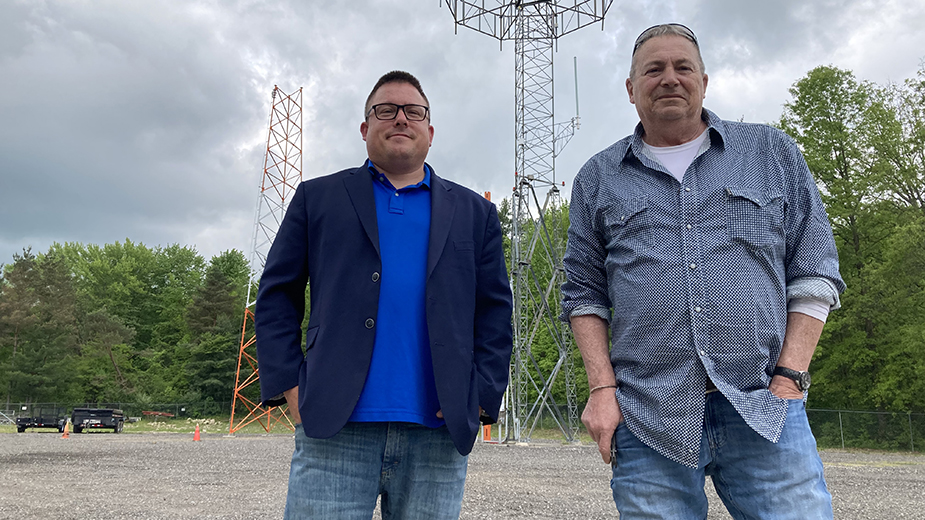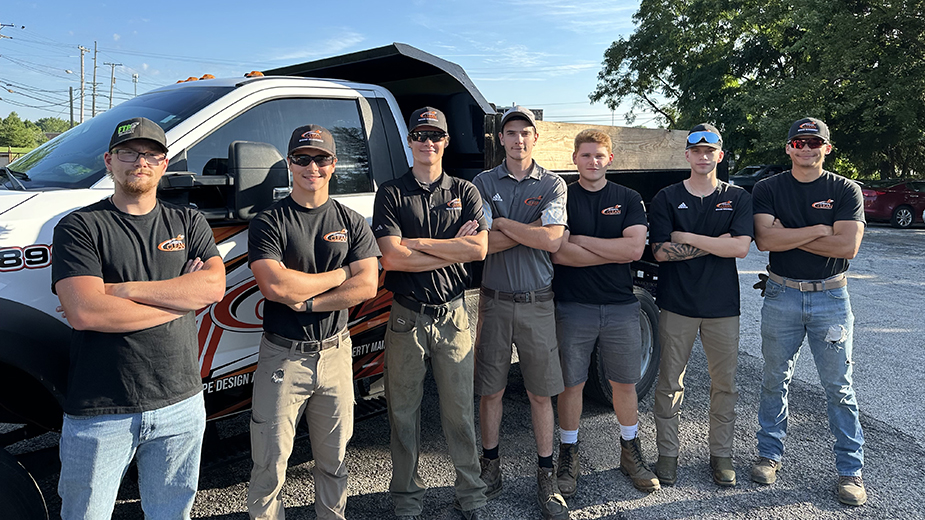A Towering Success That Began Small
AUSTINTOWN – In 1982, Doug Henry and Frank Kovach founded Tri County Tower in a barn on South Turner Road in Austintown. The two best friends, fresh from high school, were working as maintenance men for WKBN.
“One day they asked us to change the light bulbs and I thought, ‘Hell, yeah.’ I would have done it for free,” Henry recalls.
What they didn’t mention is that the light bulbs were 1,400 feet in the air atop the broadcasting tower.
“You put them in a bag. Climb up there. Take the old ones out,” he explains. “Just climb the tower. Back then it was free climb. You didn’t hook up until you stopped.”
The story is a perfect example of a common theme in the work of a tower technician: What sounds like a simple, routine task would be extremely difficult, if not impossible, for most people.
“Most people on Earth cannot do this job,” says Chris Thomas, who bought Tri County Tower from Doug and Frank in 2018. He’s also Henry’s son-in-law.
“Mistakes are unforgiving in our industry,” he elaborates. “You try not to be morbid but you have to face the reality that if you make a mistake at 300 feet, you can imagine.”
After figuring out how to perform maintenance work on the WKBN tower, Doug and Frank decided to start their own business.
“Paging took off. We were in the right place at the right time. And the big tower companies didn’t want to mess with paging until they realized how much was in it,” Henry says.
Fast forward to today: Tri County Tower has firmly established itself as a reputable full-service firm known for its commitment to quality and safety. The company’s philosophy, “quality over quantity,” has been a guiding principle since its inception, Thomas says.
“Our industry is full of guys who say they can do it fast and they cut their teeth following those guys and doing it right,” he says.
Tri County Tower employs about 30, including 12 tower technicians. It operates mainly in Ohio and adjoining states, and is expanding operations along the Eastern seaboard and in Texas.
The company recently signed a contract with the U.S. Navy to work in the Caribbean, according to Thomas. “We’re not the cheapest in the market and we don’t apologize for it. We’re priced correctly to make sure our guys have the training,” he says.
Formal training was almost unheard of in the 1980s, Henry says: “In the old days you went out and learned on the job. You learned from an old guy. If you had the guts to do it, you did it.”
Thomas says most of the industry exists to service the cellular companies but Tri County does very little cellular work because the market is too volatile.
He says the industry is currently in a lull following the launch of 5G. “They spend a lot of money rolling out the network, then have an 18-month period to recoup their investment,” Thomas explains.
During that time, he says, cellular companies spend little money. “In the last eight months that market crashed and the latest numbers I heard are that about 30% of our industry, nationally, is out of business,” he says.
The average height of the towers Tri County works on is between 300 and 500 feet. Work commonly performed by its crews of two to four technicians includes installation and maintenance of antenna systems and lighting.
“Any tower over 200 feet needs to have lighting on it. It’s an FAA requirement,” Thomas says.
The company also performs inspections.
All the work is vastly more complicated than it sounds. Henry and Thomas say most people don’t realize how demanding tower climbing is.
The safety belts the technicians wear weigh around 40 pounds. Technicians also often contend with baskets full of tools fastened to their belts.
Climbing even a small tower, Henry says, takes the wind out of most people.
“That’s just how they get to work. Now they have to start working on very sophisticated communications systems,” Thomas says.
What equipment can’t be carried is hoisted up a pulley system. If a technician forgets a piece of equipment, he must climb back down to retrieve it.
“Now you’re up there arguing. ‘You forgot it. You go down and get it.’ Even if you’re the boss, that argument is happening,” Henry says.
Some towers can be scaled in a half hour but the large 1,400-foot broadcasting towers can take three hours to climb, Henry says.
“Now what do you do if you have to go to the bathroom,” he says.
To install equipment such as 12-foot-tall microwave dishes, technicians often have to climb over, under, and around other objects.
Technicians routinely scurry across X-beams to get from one side of the tower to the other or climb out, hand-over-hand, to get underneath something they have to work on.
“You only get one or two chances to pull yourself up before you’re spent and you have to take a rest,” Henry says.
“It’s one of the most impressive things that happens in the American construction industry,” Thomas says of the work his crews perform.
It comes as no surprise then, that recruiting is of the utmost importance at Tri County. In the early days of the industry, Henry says, the best tower climbers were the kind of people who, at another job, “were bad employees. They were the fringe people.”
But the industry is becoming more mainstream as pay, training and safety measures increase, Thomas says.
Still, he says, the number of people physically capable of performing the job is small. The number of people who want to do it is smaller and the number of people who are good at it is smaller yet.
“It’s a subset of a subset of a subset. And that’s who we hunt,” Thomas says.
Chris’ wife, Elyssa Thomas, handles recruiting for Tri County. The company keeps close relationships with the local tech schools to find homegrown talent but also recruits nationally for more experienced workers.
All technicians at Tri County must earn 10 certifications before they can climb a tower. For training, two test towers are behind its main building.
Technicians receive their OSHA 10 certificates and take courses such as Rigging and Authorized Climber Rescue. Says Henry, “You have to be able to climb and then be able to rescue someone.”
The final test comes on their first day in the field when, for the first time, they must climb a real tower. Despite all their training, Henry says, no one knows whether they’re actually able until they climb a tower. “They’ve come down crying,” he says.
Many who have what it takes will gather at Tri County June 8 and 9 for the second annual “Tough Tower” competition. Tower technicians will come from across the country to compete. The competition is expected to draw 300 to 400 participants and spectators, and will highlight the skills and dedication required in the industry.
Reflecting on the company’s journey, Thomas calls his father-in-law’s story the American Dream. “It was started by two guys in a barn. They taught themselves the industry,” he says.
And it’s a dream he plans to carry on and pass to the next generation: “The commitment of our fathers is now the calling of our time. That’s what we do here.”
Pictured at top: Christopher Thomas and Doug Henry stand in front of the practice towers.
Copyright 2024 The Business Journal, Youngstown, Ohio.




